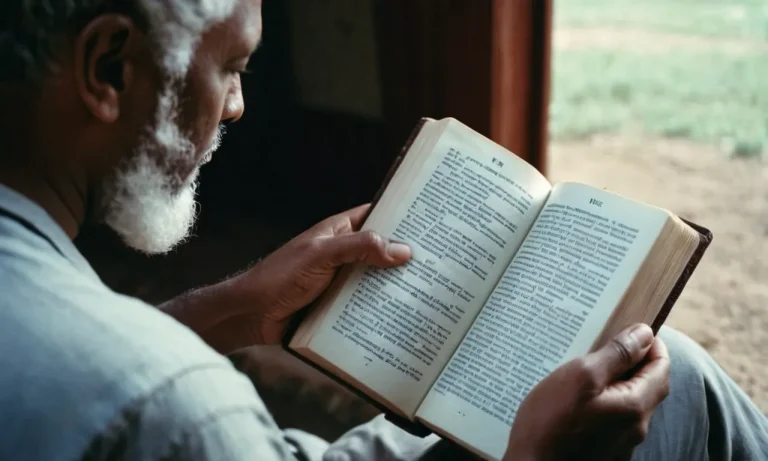What Is Your Relationship With God? A Complete Guide
The relationship one has with God is often a deeply personal matter that evolves over time. For many, it is the most important relationship in their lives, providing meaning, purpose, comfort, and direction.
This comprehensive guide will explore the multifaceted question – what is your relationship with God? We’ll provide key insights into developing, nurturing, and strengthening one’s connection to the divine.
If you’re short on time, here’s a quick answer: Your relationship with God depends on your beliefs, faith, and religious background. It may involve worship, prayer, study, good deeds, and community. The key is determining what brings you closer to God.
Defining God
Monotheistic God
Monotheistic religions believe in the existence of a single God. The three major monotheistic faiths are Judaism, Christianity, and Islam. These religions teach that there is only one supreme divine being who created the universe and expects humans to live righteous lives.
Monotheists worship God through prayer, religious rituals, and following moral codes set forth in sacred scriptures like the Torah, Bible, and Quran.
The monotheistic God is defined by attributes like omnipotence, omniscience, omnipresence, and omnibenevolence. As the sole creator and supreme power in the universe, God has unlimited might and knowledge. God is also believed to be eternally present everywhere while transcending the physical world.
Monotheists emphasize God’s complete perfection and sovereignty.
Polytheistic Gods
In contrast to monotheism, polytheistic religions believe in multiple gods and goddesses. Polytheistic faiths were among the earliest forms of religions in human civilization. Ancient Egyptian, Greek, Roman, Norse, Hindu, and Shinto religions had complex pantheons of deities that were revered for different aspects of the human experience.
The gods of polytheistic faiths often had jurisdiction over different realms like the sky, oceans, underworld, etc.
Unlike the single transcendent monotheistic God, polytheistic gods tend to be anthropomorphic and are not omnipotent creators. The gods and goddesses have personalities and flaws reflecting attributes of humanity.
Polytheistic deities interact with each other and even rely on humans to sustain them through offerings and rituals. However, they were still worshipped for having greater power and immortality than mortals.
God Within or Without
A key distinction in how religions define God is whether divinity resides externally or from within. In monotheistic faiths, God is separate from His earthly creations and humanity. There is a clear divide between the mortal world and the one supreme deity.
In Eastern faiths, the understanding of God is more complex. Hinduism and Buddhism teach that the divine lives within all things and enlightenment comes from looking inward. The atman, or eternal self, is part of the universal Brahman in Hinduism.
Buddhists seek nirvana, seeing past the illusion of independent selfhood to interconnect with all life.
Mystical and esoteric traditions like Kabbalah, Gnosticism, and Sufism explore deeper meanings of connecting to God. Through spiritual practices like meditation, asceticism, chanting, and mystical encounters, humans can transcend ego and worldly attachments to experience divine reality.
Defining God differs between cultures and faiths, but often relates to the search for meaning, ethics, liberation, or eternal truth.
Types of Relationships with God
Devotee and Deity
In the devotee and deity relationship, the devotee worships and adores God. They see God as supreme, all-powerful, and far above humanity. Devotees express their devotion through prayer, ritual, offerings, and service.
Their relationship is characterized by awe, reverence, and submission to the divine will. Devotion provides spiritual meaning and emotional fulfillment for the devotee.
Supplicant and Grantor
As supplicant and grantor, humans make requests and appeals to God for help, blessings, forgiveness, and salvation. God responds with grace, mercy, and gifts. For many believers, prayer is the primary way they interact with God. Surveys show over 55% of Americans pray daily.
Through heartfelt supplication, people open up to God and experience divine guidance, providence, and care.
Child and Parent
Many religions see God as a divine parent caring for human children. God loves, teaches, comforts, and disciplines believers. Humans, in turn, owe God honor, gratitude, obedience, and trust, as children would a parent. This familial bond creates belonging, security, moral guidance, and purpose.
Jesus taught his followers to pray to “Our Father” and see God as Abba, an intimate Aramaic term for father.
Friend and Confidant
While still respecting God’s superiority, some faiths emphasize friendship with the divine. Friends confide in each other, spend time together, and share experiences. Scriptures describe righteous individuals like Abraham and Moses conversing with God.Exodus 33:11 says “the Lord used to speak to Moses face to face, as a man speaks to his friend.”
Through friendship with the holy, people gain wisdom, comfort, and spiritual vitality.
Student and Teacher
As an infinite source of truth and knowledge, God educates humanity spiritually and morally. And like students, people continuously learn, grow in understanding, and apply the lessons taught. Many traditions have spiritual masters passing wisdom from God to disciples.
EVEN JESUS Christ, meaning “the Anointed One,” embodies God teaching humanity. Through scriptures, conscience, sages, circumstances, and more, God tutors people according to their level, giving them tests along with lessons.
Servant and Master
The servant and master relationship with the Divine emphasizes obedience, duty, and carrying out God’s will. God issues instructions, rewards loyalty, corrects errors, and expects followers to align their lives accordingly through righteous conduct and selfless service.
Major religions teach that people’s purpose is serving God by caring for others and working for the betterment of the world. Scripture says, “Well done, good and faithful servant…Enter into the joy of your master.” Matthew 25:23.
Cultivating Your Relationship with God
Prayer and Meditation
Prayer and meditation are perhaps the most fundamental ways to connect with God. Set aside quiet time each day to speak to God in prayer and listen for His voice in the stillness. This regular communication strengthens the divine bond.
Apps like Calm offer guided Christian meditations to help quiet the mind.
Participation in Religious Services
Attending church services, worship events, and small group gatherings allows fellowship with other believers. This community support reinforces faith and often leads to new friendships. Feel the holy spirit move through song, scripture, and sacrament each time you gather with other Christians.
Reading Spiritual Texts
Immersing yourself in the Bible, devotional books, or other inspirational writings builds spiritual knowledge. As you understand more of God’s nature through His word, you draw nearer to Him. Regular study also equips you to apply biblical principles to life’s challenges.
Mobile apps like YouVersion make diving into the good book easy.
Acts of Service
When you volunteer, donate resources, or help someone in need, you take part in kingdom work. As Matthew 25:40 states, serving others serves Christ himself. Whether working with the poor, sick, or marginalized, selfless acts strengthen your Christian compassion.
Non-profits like The Salvation Army organize opportunities to contribute time and talents.
Expression Through Art
God gifted humanity with creative talents, so develop yours! Sing praise songs, play worship music, or craft art for your church. Theatre and dance also channel the divine muse. Offering your artistic gifts back to God in church services cultivates an attitude of praise.
Productions like Sight and Sound’s Moses showcase believers using creativity for God’s glory.
Time in Nature
“For since the creation of the world God’s invisible qualities–his eternal power and divine nature–have been clearly seen, being understood from what has been made…” Romans 1:20 reminds us that the natural world reveals the Creator.
Escape to a park, hike a mountain trail, relax by the ocean, or just spend time in your garden. Connecting with God’s creation renews the human spirit He crafted. Outdoor ministries like Young Life Adventures lead teens to find God in nature.
Overcoming Challenges in Relating to God
Dealing with Doubt
Doubt is a common challenge in one’s relationship with God. Here are some tips for overcoming doubt:
- Examine where the doubt is coming from – your own logical reasoning, a trusted friend’s influence, or painful life experiences.
- Ask God directly and honestly about your doubts through prayer.
- Read books by authors like C.S. Lewis and Lee Strobel who faced serious doubts but found reasonable answers.
- Talk to a pastor, mentor, or wise friend who listens well and offers guidance without judgment.
- Explore resources like Reasonable Faith that tackle tough questions head-on.
Handling Anger or Disappointment with God
It’s natural to feel angry at God when facing disappointments and trials, but avoiding or suppressing anger can distance you from God. Try these tips:
- Be honest – pray and journal your real feelings to get them off your chest.
- Read Psalms and see how David and others openly expressed their anger.
- Consider if personal expectations of God are unrealistic or unbiblical.
- Confess anger as sin if it has crossed into bitterness or resentment.
- Seek Christian counselling if anger festers into depression or distrust of God.
Coping with Tragedy and Suffering
Walking through personal tragedy and suffering can profoundly impact your relationship with God. Here are some helpful perspectives and practices:
- Remember that God permits suffering but also promises to be with you in it.
- Know that God can use suffering to grow your character and dependence on Him.
- Seek comfort through Scripture, especially psalms of lament like Psalm 13.
- Allow yourself to grieve and feel pain instead of suppressing emotions.
- Trust God’s promise that He is working all things for ultimate good (Romans 8:28).
Forgiving God
Forgiving God is necessary when you feel He allowed something unfair to happen or didn’t answer prayer. Consider these tips:
- Accept that His ways are higher even when they don’t make sense to you (Isaiah 55:8-9).
- Thank Him anyway, remembering all the past and present ways He has blessed you.
- Ask Him to reveal and change anything in you that falsely feels entitled to a better life.
- Extend the same grace He’s given to forgive you by releasing resentment toward Him.
- Trust His promise to work everything out for good in the fullness of time.
Accepting Things You Cannot Change
Learning to accept difficult situations that can’t be changed is essential in relating to God. Here are some tips:
- Align your hopes to God’s word versus your own desires that feel unfulfilled.
- Release the situation and person to God in prayer instead of mentally revisiting the pain.
- Shift focus to thanking God for blessings in other areas He has given you.
- Accept that God’s way, even if hard, is perfect and ultimately for your good.
- Meditate on verses about God’s sovereignty like Daniel 4:35 and Proverbs 19:21.
Strengthening Your Bond with the Divine
Living According to Your Values
When you live your life according to your deepest values – like love, compassion, service, growth – you strengthen your connection to the divine. Making decisions and taking actions that align with your soul brings you joy and peace. Stay true to who you are.
Let your values guide you in relationships, work, and all areas of life to feel fully alive and spiritually nourished.
Finding a Supportive Spiritual Community
Surrounding yourself with like-minded people on a sacred journey deepens your spiritual bond. Attend spiritual retreats, prayer groups, houses of worship, conferences, or other communities where you can express your authentic self.
One study found over 80% of people with a strong social faith community describe having a relationship with God. Check out sites like LocalFaithCommunities.com to find your tribe.
Opening Yourself to Inspiration and Guidance
Making space for inspiration allows you to align with divine energy and guidance. Try meditative prayer, walks in nature, creating art or music, or just sitting in silence. Open your heart and mind to receive.
As spiritual teacher Soren Kierkegaard said, “If I were to wish for anything, I should not wish for wealth and power, but for the passionate sense of the potential, for the eye which, ever young and ardent, sees the possible.”
Expressing Gratitude
Expressing gratitude strengthens your spiritual connection in profound ways. Give thanks from your heart for blessings, challenges that grew you, people who support you, and the wonder of life. Write thank you notes, offer prayers of gratitude, or say grace before meals.
Research shows cultivating gratitude boosts spiritual well-being. Try keeping a gratitude journal or create art representing what you’re grateful for.
Embracing Mysteries
Surrendering the need to logically understand everything opens you to sacred mystery. Give yourself permission to not know or be in control. Feel the freedom in the space between thoughts and questions. Embrace the unknowable, the intuitive, and the magical that exists beyond the logical mind.
As writer Madeleine L’engle said “I believe in intuition and inspiration. Imagination is more important than knowledge. For knowledge is limited, whereas imagination embraces the entire world.”
Conclusion
A relationship with God can be incredibly fulfilling, providing purpose and peace. But it must be built thoughtfully through practices that align with your beliefs. There is no one right way – feel free to evolve your connection as you grow.
The key is being open and devoted to developing a sincere relationship with the divine force in your life.








